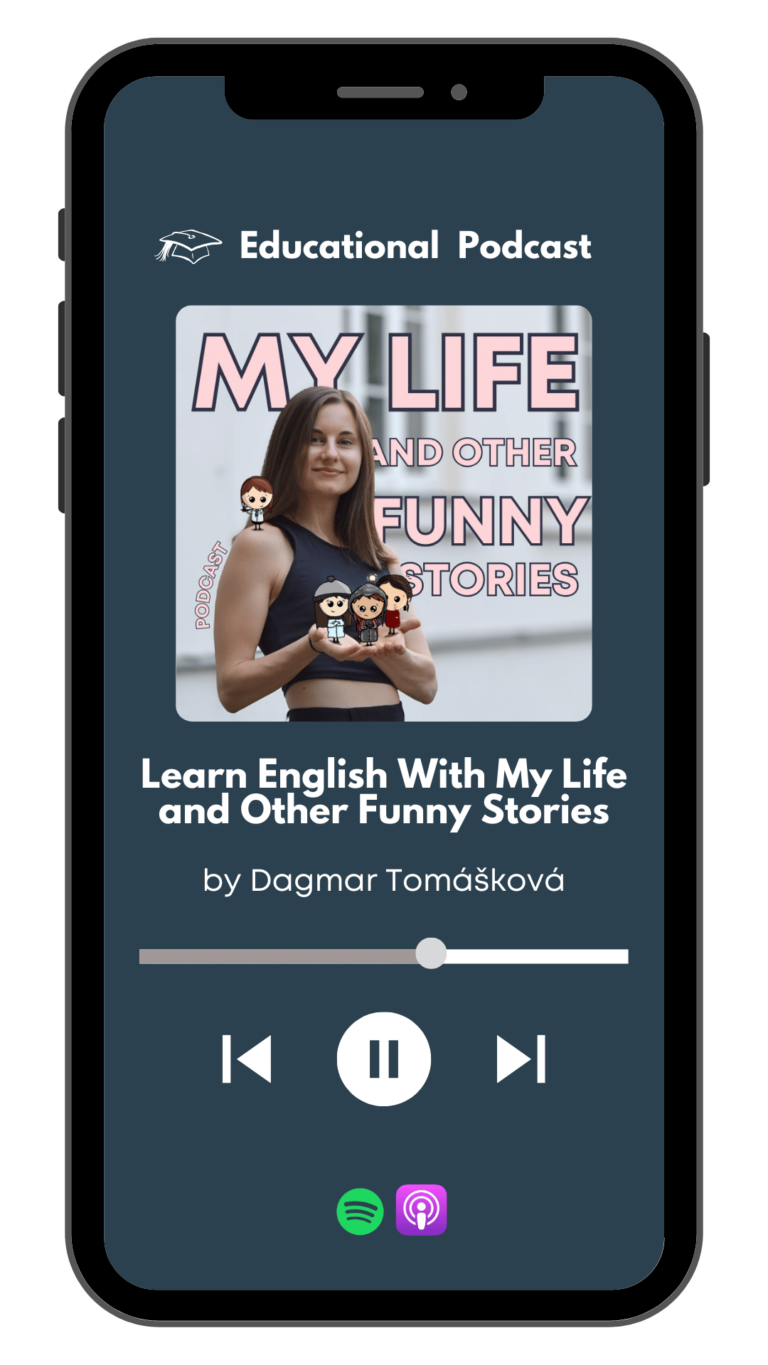
Ep.102: „I Understand But… I Can’t Speak“ – What To Do?
And today, I want to talk about something that I hear all the time from students. They tell me: “I understand English, but I can’t speak.” If you’ve ever felt that way, this episode is for you.

LISTEN TO THE EPISODE HERE:
soon <3

Pokud chceš tento podcast a mou tvorbu podpořit, teď můžeš tady!

WRITTEN TRANSCRIPTION OF THE PODCAST
Hello and welcome to my podcast My Life and Other Funny Stories. My name is Dagmar Tomášková, I am an English tutor and coach and I created this podcast for English students who want to improve their oral comprehension. As always, you can find the transcription of this episode and the vocabulary list in the notes of the podcast.
And today, I want to talk about something that I hear all the time from students. They tell me: “I understand English, but I can’t speak.” If you’ve ever felt that way, this episode is for you.
So let’s break it down. Why does this happen? Why can you listen to a podcast like this one, maybe understand ninety percent, but then when you try to open your mouth, it feels like your brain goes completely blank? The main reason is that understanding and speaking are two different skills. They’re connected, of course, but they are not the same muscle. Think of it like this: you can watch football every week, you can know all the rules, you can even understand the tactics, but if someone suddenly puts you on the field and gives you the ball, you probably won’t play like a professional, right? Because you never trained the physical part. It’s the same with speaking English. You might understand everything, but if you haven’t practised producing the words, your mouth just isn’t used to it.
Let me just tell you – it is so common and absolutely normal. Every language learner goes through this stage. And there are concrete things you can do to move from passive understanding to active speaking. Let me give you some practical tips.
Tip number one: shadowing. This is a technique where you listen to a sentence and repeat it immediately, trying to copy not only the words but also the rhythm and the intonation. For example, you can take a short YouTube video or even use this podcast. Play a sentence, pause, and then say it out loud exactly as you heard it. At first, it feels silly, like you are a parrot, but it works. You are training your mouth to move in the same way as native speakers. Also, you think you know how the phrases and words and pronounced but then, when you actually want to use it, you find out that you don’t know how. Trust me, it happened to me so many times in French. You just really need to try to say it out loud, not only in your head.
Tip number two: lower the pressure. A lot of students are afraid to speak because they think, “I have to speak perfectly. No mistakes, perfect grammar and everyone is judging me” But if you wait until you’re perfect, you’ll never open your mouth. So…making mistakes is not only okay, it’s necessary. Every time you make a mistake, you’re giving your brain feedback. The only people who don’t make mistakes are the ones who never speak. The only reason why I can speak English like this is because I probably made 1000x more mistakes than you throughout my learning journey.
Tip number three: start with small speaking moments. You don’t need to give a TED talk in English tomorrow. Or record a 10-minute podcast. You can start much smaller. For example, order your coffee in English if you are abroad. Or, if you are not abroad, speak to yourself. When you’re cooking dinner, say out loud what you are doing: “I’m chopping the onions, I’m boiling the pasta.” When you’re driving, you can describe the traffic around you: “The car in front of me is turning left, there’s a cyclist coming.” It feels a bit weird at first, but it builds fluency because you’re practising turning your thoughts into words in real time. I speak to myself in French all the time. I live alone right now so it makes it quite easy but even when I am on a walk and there is no one around, I just articulate my thoughts in French out loud. And that is when I come across words that I don’t know. I take out my phone, I write into my notes the words I didn’t know and when I have time, I find the translations. And that is how I learn actively.
Tip number four: find conversation opportunities. The internet makes this so much easier. You can find a language partner, join a group conversation club, or work with a tutor. The important thing is consistency. Speaking once a month won’t change much. Speaking a little bit every week will make a huge difference. Just this Monday, my student Renča told me – I feel so much more at ease with speaking. I used to be so nervous and afraid of saying anything, but I am starting to feel less and less nervous and I even use English more at work. And that was after 11 conversations. You might think – 11 conversations? So many? But those are not even 3 months. What if I told you that in three months, you could feel much more confident while speaking English and you might actually enjoy it? Wouldn’t you take it?
And here’s another trick that many of my students find helpful: recycle phrases. Instead of trying to invent new sentences every time, take a few useful phrases and reuse them in different situations. For example: “In my opinion…” or “I guess it depends.” These are little blocks that you can pull out without thinking, and they give you more time to build the rest of your sentence. I use fixed phrases all the time – you don’t need to reinvent the wheel. These phrases are effective for a reason.
Let’s talk about mindset a little bit. Because sometimes it’s not really about English, it’s about psychology. Students tell me: “I can’t speak,” but what they really mean is: “I’m afraid to speak.” They give me a 10-minute speech about how bad their English is going to sound, that they don’t know anything and bla bla bla and then we talk. And guess what? It is absolutely fine and their English is actually good. They worry about sounding stupid, or about people judging them. But you know what? Most people don’t care if you make a mistake. If you’re speaking with a native speaker, they are usually just happy that you’re making the effort. Nobody expects you to sound like the BBC or CNN. They just want to understand you. So try to shift your focus. Don’t ask yourself, “Was my grammar perfect?” Instead, ask, “Did the person understand me?” That’s the real goal of communication. I asked my American friend Audrey this question and she told me – “I really don’t care if anyone makes a mistake. I couldn’t care less. I can see that they are trying and that’s all that matters.”
At the end of the day, what is your goal on your journey of learning English? Is it being a university teacher of English grammar? Or is it more about getting your ideas across, communicating with colleagues or a boss at work and being able to talk to people when you travel? Because if your goal is communication, then, and I know this might come as a surprise, you must start communicating.
So, let’s summarise. If you feel like “I understand, but I can’t speak,” remember that it’s normal. It just means your passive skills are stronger than your active skills. To change that, you need to practise speaking. Shadowing, lowering the pressure, starting with small moments, finding opportunities to talk, recycling phrases, and working on your mindset… these are all tools that will help you.
Speaking is a skill. The more you practise, the easier it becomes. I promise you, one day you will catch yourself having a conversation in English and suddenly you’ll think: “Wait… I’m doing it. I’m speaking.”
Thank you so much for listening to today’s episode. If you liked it, please leave me a five-star rating and share it with your friends. And remember, you can always find the transcript and the vocabulary list in the notes of the podcast. See you next time. Bye bye.

VOCABULARY LIST
to break it down – rozebrat to (vysvětlit jednoduše)
blank (my mind went blank) – prázdno v hlavě
stage – fáze, etapa
shadowing – metoda stínování (opakování po mluvčím)
out loud – nahlas
to lower the pressure – snížit tlak / stres
to come across (a word) – narazit na (slovo)
to take out (your phone) – vytáhnout (telefon)
at ease (to feel at ease) – cítit se uvolněně / v pohodě
confident – sebejistý
to recycle phrases – znovu používat fráze
to reinvent the wheel – znovu vynalézat kolo (dělat něco zbytečně složitě)
to give a speech – pronést proslov
to judge (someone) – soudit (někoho)
I couldn’t care less – je mi to úplně jedno
to shift your focus – změnit zaměření / pozornost
to get your ideas across – vyjádřit své myšlenky
to catch yourself (doing something) – přistihnout se (při něčem)